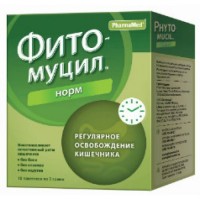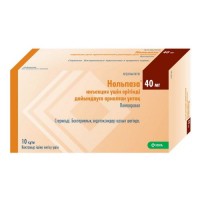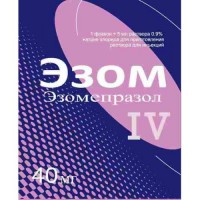Rennie with orange flavor chewing (24 tablets).
- $8.30
Sku:
7d14c65ae878
Brand:
Delpharm Gaillard (France)
The instruction for medical use of Renni® medicine with an orange flavor the Trade name of Renni® with an orange flavor the International unlicensed name Is not present the Dosage form chewable tablets Structure One tablet contains active agents: calcium carbonate of 680 mg, magnesium carbonate of the main 80 mg, excipients: sucrose, starch corn prezhelatinizirovanny, potato starch, talc, magnesium stearate, paraffin easy liquid, orange additive, sodium saccharin. The description square tablets, White with a creamy shade, with concave surfaces and marking of RENNIE on both sides, with an orange smell. Pharmacotherapeutic group Drugs for treatment of the diseases connected with disturbance of acidity. Antacids. Antacids in combination with other drugs. The ATX A02AX code the Pharmacological Pharmacokinetics as a result of properties of interaction of drug of Rennie with gastric juice in a stomach are formed soluble salts of calcium and magnesium. Calcium and magnesium can be soaked up from these soluble salts. Nevertheless, the level of absorption of calcium and magnesium depends on a drug dose. Maximum level of absorption of calcium about 10% and magnesium about 15-20%. Healthy people have small amounts of calcium and magnesium, as a rule, are soaked up and quickly brought out of an organism through kidneys. In a renal failure, the level of concentration of calcium and magnesium can increase in plasma. In intestines insoluble compounds which are removed with a stake are formed of soluble salts. A pharmacodynamics Antiacid substances – calcium a carbonate and magnesium a carbonate provide fast neutralization of excess of hydrochloric acid of gastric juice. The principle of action local, does not depend on intake of active ingredients in a system blood stream. The neutralized effect of calcium of a carbonate amplifies carbonate magnesium addition. Indications In heartburn and hyperoxemia of gastric juice. The route of administration and doses Adults and children are more senior than 15 years the Usual dosage within 24 hours: on 1-2 tablets to chew (or to hold in a mouth before full resorption). - In severe pain the dose can be increased for a short time up to 11 tablets a day. The maximum daily dose – 11 tablets. Duration of intake of medicine should not exceed 10 days. Side effects from the immune system: very seldom allergic reactions – rash, urticaria, a Quincke's edema and an acute anaphylaxis. From a GIT: nausea, vomiting, indigestion and diarrhea. From kidneys and urinary tract: at patients with a renal failure the use of drug can lead to a gipermagniyemiya, a hypercalcemia, risk of development of a nephrolithiasis, a renal failure and to an alkalosis that can provoke emergence of symptoms from a GIT (nausea, vomiting, a constipation or a diarrhea) and muscle weakness. From a musculoskeletal system: muscle weakness. From nervous system: loss of taste, headache. The side reactions connected with a milk and alkaline syndrome: asthenia and calcification. Contraindications – the increased individual sensitivity to drug components – the profound renal failures – a hypercalcemia – a hypercalcuria – children's age up to 15 years – persons with hereditary intolerance of fructose, deficiency of Lapp enzyme - lactases, malyabsortsiy glucose - a galactose. Medicinal interaction At a concomitant use decreases absorption in digestive tract of other medicines accepted inside. As a precautionary measure it is reasonable to accept antacids separately from other medicines. It is recommended to accept medicine of Rennie in 2 hours prior to or after intake of the following medicines: antihistaminic drugs, atenolol, metoprolol, propranolol, bisfosfonata, chloroquine, tsiklina, diflunizat, cardiac glycosides, Ethambutolum, iron (salts), feksofenadin, fluorine, ftorkhinolona, glucocorticoids, indometacin, an isoniazid, ketokonazol, lansoprozol, linkozamida, left thyroxine, neuroleptics of a fenotiazinovy row, Penicillaminum, phosphates, thyroxine. Renal excretion of salicylates due to urine alkalization increases. Side effects were observed in combination with thiazide diuretics or at the patients accepting a large number of milk or dairy products, especially at long-term treatment. It is regular to control amount of calcium at simultaneous use with thiazide diuretics (reduce calcium excretion). Special instructions It is necessary to avoid prolonged use. Rennie should not use for treatment more than 10 days. Patients are recommended to see a doctor, in the presence of the following symptoms: loss of weight, difficulty of swallowing or constant discomfort in a stomach, digestion disturbances. When prescribing drug the patients with disturbance of renal function should control regularly concentration of magnesium and calcium in blood serum. Due to the sucrose presence (1 tablet of 475 mg of sucrose) Rennie's drug is not recommended to be taken at intolerance of fructose, disturbance of absorption of glucose and a galactose. Pregnancy and a lactation When assigning in high doses and long administration of calcium carbonate the development of anomalies in the form of ossification was revealed. When assigning in the recommended doses the data on developing of malformations or embriotoksichesky effects are not found. Nevertheless, data on cases of intake of medicine by pregnant women are insufficient for an exception of possible risk. Therefore prescribing of drug to women during pregnancy can be considered only in case of absolute necessity. When prescribing drug the pregnant woman should consider that salts of magnesium can cause development of diarrhea, at intake of salts of calcium in a high dose there is a risk of a hypercalcemia with calcification of internals, including kidneys for a long time. The drug can be taken in the period of a lactation on condition of observance of recommendations about use. Does not render feature of influence on ability to run the vehicle or potentially dangerous mechanisms. The overdose Mainly at patients with a renal failure, can lead long reception of high doses of drug to a renal failure, a gipermagniyemiya, a hypercalcemia and an alkalosis that can provoke emergence of symptoms from digestive tract (nausea, vomiting, disturbance of a chair) and muscle weakness. Treatment: to stop administration of drug and to accept enough liquid. Symptomatic treatment. A form of release and packing On 12 tablets in blister strip packaging from a film of polyvinylchloride and aluminum foil. On 1 or 2 blister strip packagings together with the instruction for medical use in the state and Russian languages put in a cardboard pack. To Store storage conditions at a temperature not above 25 °C. To store out of children's reach! Period of storage 3 years. Not to apply after the expiration date specified on packing. Prescription status Without prescription. The name and the address of the organization-proizvoditelya/of the packer Delpharm Gayard, 33 Rue De L'Indoustriie, 74240 Gayard, France the Name and the country of the holder of the registration certificate of Bayer Konsyyumer Ker AG, Switzerland the Name, the address and a contact information of the organization in the territory of the Republic of Kazakhstan the accepting claim (offer) from consumers on quality of medicine TOO Bayer KAZ Timiryazev St., 42, pavilion 15, office 301 050057 of Almaty, the Republic of Kazakhstan, ph. +7 727 258 80 40, fax: +7 727 258 80 39 e-mail: kz.claims@bayer.com the Name, the address and a contact information of the organization in the territory of the Republic of Kazakhstan responsible for post-registration observation of safety of medicine TOO Bayer KAZ Timiryazev St., 42, pavilion 15, office 301 050057 of Almaty, the Republic of Kazakhstan, ph. +7 701 715 78 46 (round the clock) ph. +7 727 258 80 40, vn. 106 (in working hours) fax: +7 727 258 80 39 e-mail: pv.centralasia@bayer.com








